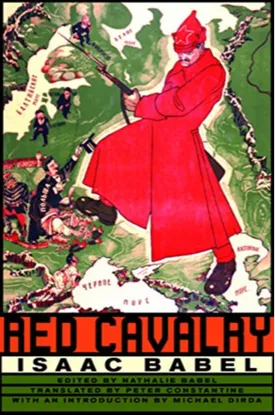Red Cavalry by Isaac Babel is a 1920 novella considered by many to be a masterpiece of Russian literature. Written as a compilation of short stories and vignettes, the novella follows a unit of a Red Cavalry division during the 1920 Russian Civil War. The narrator and protagonist is the Jewish writer and soldier Grigory Lyutov.
The short stories of the novella tell of Lyutov’s experiences among the Cossack regiments of the Red Army and their encounters with hostile Polish forces. Through these encounters, the reader is brought into the brutal reality of war and the effects of war on individuals and entire nations. Lyutov himself experiences the violence, emotions, and frustrations of warfare.
The focal point of the novella is the notion of death as a reality of war. Death appears in the narrative in various forms, including massacres, soldier’s comrades dying, and the imminent possibility of death. Looking at death in an almost surreal way, Babel portrays it as something almost outside reality, a natural occurrence. The stories accumulate to suggest that war is a cyclical occurrence that has been repeated over and over again throughout history with no end in sight.
The atmosphere created by Babel in Red Cavalry is one of sorrow and desolation, with little hope of transformation or change. Lyutov’s perspective is often bleak and fatalistic, as he stares death directly in the face and acknowledges the grim realities of battle. While Lyutov’s experiences provide the reader with a unique glimpse into war, the novella avoids the glorification commonly associated with the themes of war and instead offers an intimate exploration of the psychological toll war takes on individuals.
While the subject of death looms large throughout the story, Babel’s writing equally emphasizes the mundane moments of camp life, the friendships fostered between soldiers, and other perspectives offering a strange juxtaposition to the reality of war. Additionally, while Lyutov’s individual story occasionally takes the lead, the overall narrative provided is one of an entire nation and its struggles in the midst of war.
Red Cavalry offers a unique view of wartime life, one that is both personal and philosophical. The novella’s characters and situations expose the horrible truths of war, and yet still suggest a kind of poetry in the desolation. The combination of philosophical depth and lyrical writing makes Red Cavalry undoubtedly one of the most important works in Russian literature, a literary masterpiece that will continue to be read and studied for many years to come.

